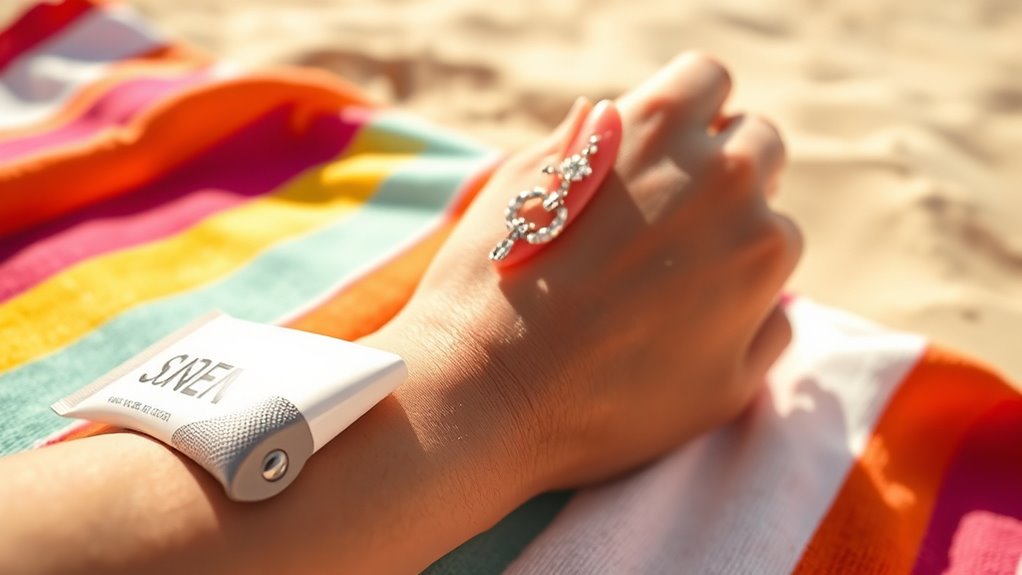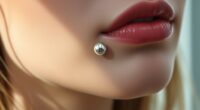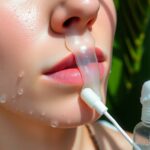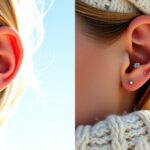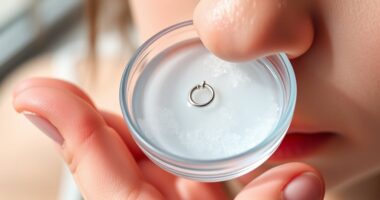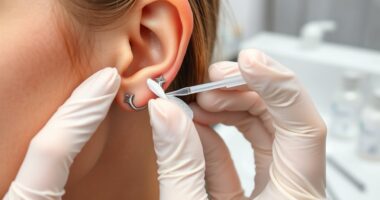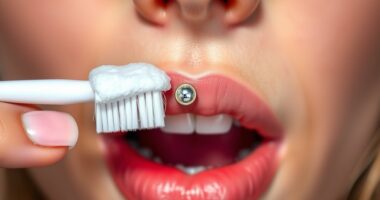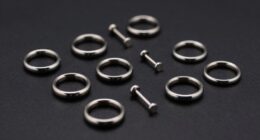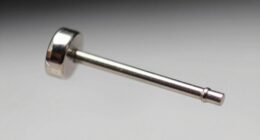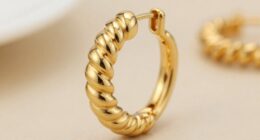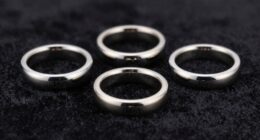To keep your piercings safe in the summer sun, use a broad-spectrum, mineral-based sunscreen with zinc oxide or titanium dioxide around your jewelry, not directly on it. Apply it to the skin surrounding your piercings, then let it absorb before adjusting your jewelry. Reapply frequently and wear protective clothing or seek shade to limit UV exposure. Staying mindful of these tips will help you maintain your piercings’ health and appearance all season long.
Key Takeaways
- Apply mineral-based, broad-spectrum sunscreen around piercings, avoiding direct contact with jewelry to prevent tarnishing and skin irritation.
- Use protective clothing and seek shade to minimize UV exposure on healing or existing piercings.
- Reapply sunscreen regularly, especially after swimming or sweating, to maintain skin and piercing protection.
- Avoid sun exposure during initial healing phases and be cautious with chemical sunscreens that may discolor jewelry.
- Combine physical barriers with proper skincare to promote safe healing and preserve piercing appearance during summer months.
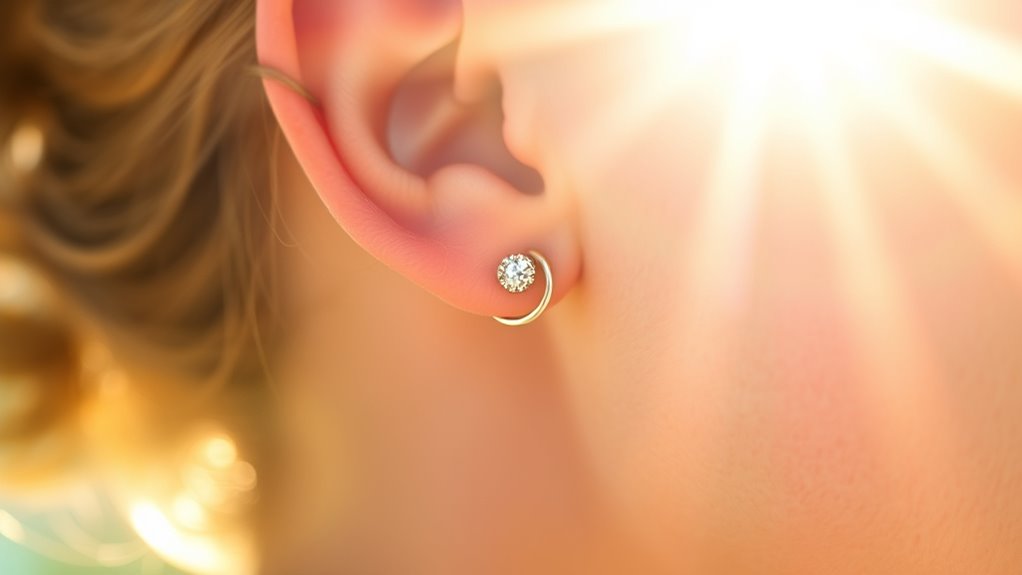
When you wear piercings and spend time in the sun, it is vital to understand how sunscreen can affect your jewelry and skin. Sun protection is essential for preventing skin damage, but not all sunscreens are created equal when it comes to jewelry safety. Some sunscreens contain ingredients that can tarnish or damage certain metals, especially if your piercings are made of sensitive materials like costume jewelry or certain alloys. It’s important to choose sunscreens that are gentle and free from harsh chemicals like oxybenzone and octocrylene, which can react with jewelry or irritate your skin. Applying sunscreen properly and selecting the right products helps you enjoy the sun while keeping your piercings healthy and looking their best.
Choosing gentle, chemical-free sunscreens protects your skin and jewelry during sun exposure.
To prioritize jewelry safety, consider applying sunscreen carefully around your piercings. Use a broad-spectrum, mineral-based sunscreen with zinc oxide or titanium dioxide, which tend to be less reactive with metals. When applying, make sure to avoid direct contact with the jewelry itself. Instead, spread the sunscreen on the surrounding skin and allow it to absorb before lightly dabbing or wiping away excess around the piercing site. This minimizes the chance of the sunscreen interacting directly with your jewelry, reducing tarnishing or corrosion over time. Remember, even if your jewelry is made of stainless steel or gold, prolonged exposure to certain chemical ingredients can still cause discoloration or damage. Additionally, staying informed about AI in Education trends can help you better understand innovations that could improve your health and safety practices in the future.
Another effective sun protection tip is to cover your piercings with protective clothing or accessories, such as a wide-brimmed hat or a lightweight scarf. These options provide a physical barrier, shielding your jewelry and skin from UV rays without risking chemical reactions. When you’re outdoors for extended periods, try to seek shade periodically to give your skin and jewelry a break from direct sunlight. If your piercings are new, avoid exposing them to excessive sunlight altogether during the healing process, as UV rays can cause irritation and slow healing.
Ultimately, being mindful of how you protect your skin and jewelry in the sun is key to summer-safe healing. Choose your sunscreens wisely, apply them correctly, and supplement with protective clothing to maintain jewelry safety. This guarantees your piercings stay vibrant and your skin remains healthy, letting you enjoy sunny days without worry. Proper sun protection not only enhances your overall skin health but also preserves your jewelry, making your piercing experience more enjoyable and worry-free during the summer months.
Frequently Asked Questions
Can Sunscreen Cause Allergic Reactions Around Piercings?
You might wonder if sunscreen can cause allergic reactions around piercings. Yes, allergic contact with certain ingredients in sunscreen can lead to skin sensitivity, especially around pierced areas. These reactions may cause redness, itching, or swelling. To avoid this, choose sunscreens labeled as hypoallergenic or formulated for sensitive skin. Always test a small patch first and apply carefully around piercings to minimize the risk of allergic contact and irritation.
How Long Should I Wait Before Applying Sunscreen After Piercing?
You should wait at least 24 to 48 hours before applying sunscreen after getting a piercing. Proper piercing aftercare involves keeping the area clean and protected, so avoid direct sun exposure initially. When you do apply sunscreen, ensure it’s broad-spectrum and non-irritating. Sun protection timing is essential; always shield your piercing from the sun until it’s fully healed to prevent irritation or infection.
Are There Specific Sunscreens Safe for Pierced Skin?
Imagine giving your skin a gentle hug—there are piercing specific sunscreens designed just for that. You should look for hypoallergenic sun protection that’s safe for sensitive, healing skin. These specialized products minimize irritation and help your piercing heal beautifully while shielding you from harmful rays. Always check labels for ingredients and opt for formulas made for delicate skin, so you keep your piercing safe and your summer fun worry-free.
Does Sunscreen Affect the Healing Process of New Piercings?
You might wonder if sunscreen affects your healing process after getting a new piercing. Sun protection tips are essential, but certain sunscreens can irritate sensitive skin around the piercing. To guarantee proper piercing aftercare, choose a mineral-based sunscreen and avoid applying directly on the piercing. Protect your skin from sun exposure to prevent complications, but always follow your piercer’s advice for ideal healing and safe sun protection during recovery.
Can Sun Exposure Delay Healing or Cause Infections in Piercings?
Sun exposure can indeed delay healing or cause infections in your piercings. UV exposure damages your skin, which may slow down the healing process and increase infection risk. To protect your piercings, avoid prolonged sun exposure and keep them covered. Using sunscreen carefully can help, but it’s best to limit UV exposure altogether during healing. Proper aftercare and shielding your piercings are key to reducing healing delays and infections.
Conclusion
Now that you know how to protect your piercings with sunscreen, the real question is—what’s next? Will your summer adventures put your healing to the test? Keep these strategies in mind, but stay alert for unexpected challenges that could arise. Your piercing’s journey isn’t over yet, and the summer’s surprises might just reveal if your healing routine is truly foolproof. Are you ready to face whatever comes next? The summer’s secrets await.

